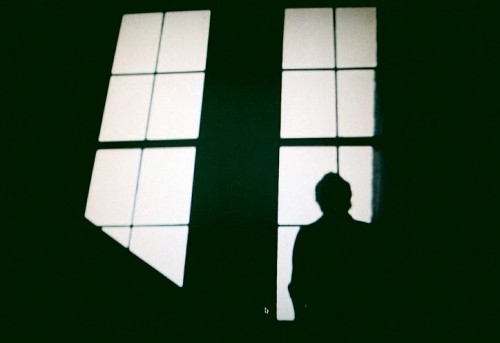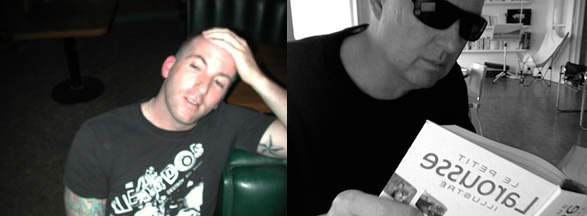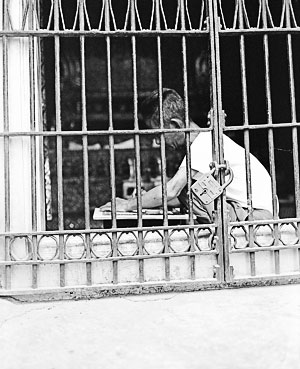Matthew Simmons
Matthew Simmons lives in Seattle.
Matthew Simmons lives in Seattle.
Vermin on the Mount host and Jean-Philippe Toussaint interviewer Jim Ruland is going to write for nine straight hours for the benefit of San Diego Writers. A great writer and a good cause. Also, free t-shirt!
The Moby Awards (Best Book Trailer) finalists are announced. Good on the lot of you! (Happy to see Kathryn Regina’s I’m In The Air Right Now on the list, as I suggested it. Happy to see the others, too. Also, though, self-attentive.)

The Last House on Dead End Street
I found an interesting parallel in the two films from The List that I rented this weekend. They were Kiyoshi Kurosawa’s Cure and Roger Watkins’s The Last House on Dead End Street.
Central to both films are abadoned, decrepit buildings. In Cure—a serial killer film that is more about mood and psychological tension than the gorefest that is LHODES—it’s an old hospital.
Let’s get those phones made, people.
httpv://www.youtube.com/watch?v=5BXr_4g0o9M
httpv://www.youtube.com/watch?v=Puph1hejMQE
Adding more as they occur to me. Adding a jump for to not take so much of the blog spaces.
READ MORE >
Music For Real Airports from The Black Dog on Vimeo.
An electronic group called The Black Dog thinks that Brian Eno got it wrong. So they have tried to rectify the problem.
In 1978, Brian Eno released an album called Music for Airports. It’s a classic, a sacred cow of ambient music, written by the man who coined the term for the genre. It’s also meant to be used by airports, intended to be played to help release the tensions of travel.
That doesn’t sit right with The Black Dog. They have responded with Music for Real Airports. From their press release: “”Airports have some of the glossiest surfaces in modern culture, but the fear underneath remains. Hence this record is not a utilitarian accompaniment to airports, in the sense of reinforcing the false utopia and fake idealism of air travel. Unlike Eno’s Music For Airports, this is not a record to be used by airport authorities to lull their customers.”
Here’s a task. Take a classic piece of writing. Decide what you think it intends to do. (A famous—and very simple—example: Candide intends to satirize Gottfried Leibniz’s optimism, that we live in the best of all possible worlds*.) Disagree with that. Even if you agree with it, find a way to disagree with it. Embrace the contrarian within.
Not the most original prompt, I admit. But a slight twist on it, I hope.
* And, yes. Voltaire misunderstood Leibniz.
httpv://www.youtube.com/watch?v=Unw8YYKYZPQ
If you—like me—went through that list of films Blake linked to earlier and said, “Man, I haven’t seen more than four or five of those,” then watch the above video. And then you’ve seen another!
I’m a fan of people who work with found footage so am happy to have been introduces to Peter Tscherkassky. The soundtrack on that piece is hypnotic.
Anyone else I should know about?

My friend (and yours) Jim Ruland had a chance to speak to Jean-Philippe Toussaint recently, and sent this interview. I was going to run it on Hobart, but the schedule didn’t allow for it to appear in a timely manner there. Instead, we are cross posting it here at HTML Giant and on Hobart’s lovely blog to get the interview as much attention as we can.
Jean-Philippe Toussaint is the author of nine novels. Originally, published in France, the slender books have secured the Belgian author a reputation as a stylist who favors impressions over plot, comic situations over character development. Since 2007, Dalkey Archive Press has been publishing Toussaint’s work in English, trickling out two or three novels a year to a growing audience of eager enthusiasts for the quirky little books.
The most recent novel, Self-Portrait Abroad, released earlier this month, features a Belgian author traveling to cities in Europe and Asia. A sensual train trip to Prague, a visit to a strip joint in Nara, a victory in a lawn bowling tournament in Cap Corse are described in Toussaint’s quintessential style. READ MORE >
 Here’s something to read:
Here’s something to read:
“The young ones called each other out from their cells. Set to set, block to block, nation to nation. They called each other soldier. Six pop, five drop, nines and gats and gauges. Greetings and threats indistinguishable in the voices of monster children.”
—Firework, Eugene Marten, Tyrant Books
So, this is from the galley, which arrived on my desk at work today. I read the first 20 or so pages in a doctor’s waiting room. The first pages take place in a jail.
When you get a galley, it reminds you—the reader—that it is an uncorrected proof, and that some small changes may be made, and that you should check with the publicity department or the finished book before quoting from it somewhere.
I didn’t do that. I’m not going to do that. Read that paragraph—what would you change?
Seriously, Gian. If you change anything in that paragraph, I’m coming for your ass.
Leszek (Lech) Jankowski wrote the music for the Brother’s Quay film “The Street of Crocodiles.” Here is a short blog post that includes a link to an mp3 of that soundtrack. Here’s his website. Right now, my head sounds like this guy’s music. If you need me, I’ll be in bed.